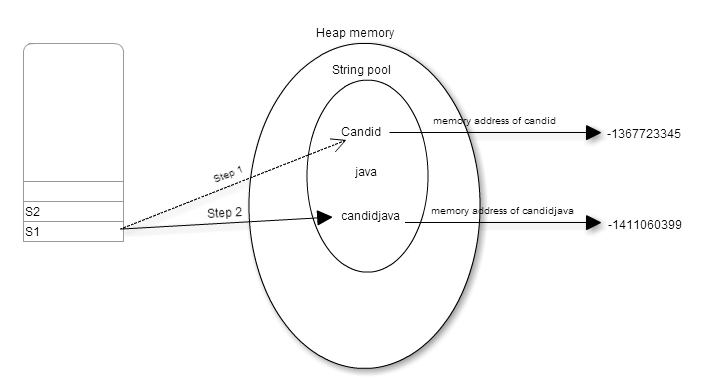Why Are Strings Immutable in Java? Comprehensive Guide for Beginners
Why Are Strings Immutable in Java? Comprehensive Guide for Beginners
Blog Article
What Is Unalterable Strings and Exactly How It Functions
In the world of programming, understanding the idea of immutable strings is paramount for creating protected and robust applications. Unalterable strings refer to strings that can not be changed after they are produced, guaranteeing data honesty and predictability within the code.
The Fundamentals of Unalterable Strings
Unalterable strings, as an essential concept in shows, are character series that can not be transformed once they are developed. This means that when a string is assigned a value, that worth can not be changed. In languages like Python and Java, strings are unalterable things, bring about various effects in regards to memory monitoring and data stability.
One of the vital benefits of immutable strings is that they provide a sense of safety in information adjustment. Considering that the content of an unalterable string can not be customized, it makes certain that the original information remains intact, reducing the danger of unexpected changes during program implementation (Why are strings immutable in Java?). This residential property additionally simplifies debugging procedures, as programmers can trust that when a string is specified, its worth will certainly not be accidentally changed
When a new string is produced based on an existing one, instead than changing the original string, the new value is stored independently. Overall, recognizing the essentials of unalterable strings is crucial for understanding programs principles and maximizing code effectiveness.
Benefits of Unalterable Strings
Structure upon the protection and performance benefits of immutable strings, their advantages encompass enhancing code reliability and simplifying simultaneous programming jobs. By being unalterable, strings can not be customized after development, which eliminates the risk of unintentional changes in the information they save. This intrinsic immutability makes sure that once a string is created, its value stays constant throughout the program's implementation, reducing the opportunities of pests brought on by unanticipated alterations.
In addition, immutable strings add to code reliability by making it simpler to reason about the state of a program. Given that strings can not be changed, designers can rely on that a string will constantly hold the same worth, streamlining debugging and maintenance efforts. This predictability results in more secure and reliable codebases.

Implementation in Programs Languages
Within different programs languages, the incorporation of immutable strings is an essential facet that affects just how data is handled and manipulated within code structures. The application check out this site of immutable strings varies throughout different programming languages, with each language offering its very own devices to support this principle.

On the other hand, languages like C and C++ do not have integrated support for immutable strings. Designers in these languages have to manually execute immutability by imposing policies within their code to stop direct alterations to string things.
Best Practices for Working With Unalterable Strings
When managing unalterable strings in programming languages like Java and Python, sticking to ideal methods ensures effective and secure information adjustment. One of the crucial finest techniques is to utilize StringBuilder or StringBuffer rather than directly manipulating strings, particularly when dealing with substantial concatenation procedures. These classes give mutable choices for string adjustment, helping to avoid unnecessary memory allotments and improving performance.
Another best practice is to use string interpolation or format operates given by the language rather of manual concatenation. This not only improves readability however additionally aids in stopping common challenges such as unintentional string modifications. Furthermore, when dealing with sensitive data such as passwords or API tricks, it is essential to stay clear of keeping them as simple message in immutable strings. Utilizing safe and secure storage space systems like char varieties or specialized collections for managing delicate info helps minimize safety threats connected with unalterable strings.
Real-world Applications and Instances
Exploring sensible implementations of immutable strings in numerous markets reveals their considerable influence on information honesty and system reliability. In the health care field, immutable strings play a vital function in guaranteeing see this website the safety and security and privacy of individual data. By avoiding unapproved alterations to delicate details such as clinical documents and prescriptions, unalterable strings help maintain conformity with rigorous privacy policies like HIPAA.
Monetary organizations likewise benefit from the immutable nature of strings to improve the safety of consumer information and deal records. Immutable strings help protect against fraudulence and unapproved changes to monetary information, providing a durable defense against cyber risks and making certain the depend on and confidence of customers.

Conclusion
In conclusion, immutable strings are dealt with and unchangeable series of personalities that offer advantages such as string security and enhanced efficiency in shows. They are applied in various shows languages to ensure data honesty and safety. Best methods for working with immutable strings consist of preventing direct modifications and making use of techniques that return brand-new string things. Real-world applications next page of immutable strings consist of data file encryption, caching, and string control jobs.
Immutable strings refer to strings that can not be modified after they are produced, ensuring data integrity and predictability within the code. When a brand-new string is produced based on an existing one, instead than changing the original string, the new value is saved individually.In languages like Java and Python, strings are immutable by default, implying that when a string things is produced, its worth can not be altered - Why are strings immutable in Java?. Ideal methods for working with immutable strings consist of preventing straight adjustments and using approaches that return brand-new string things. Real-world applications of immutable strings consist of information security, caching, and string manipulation tasks
Report this page